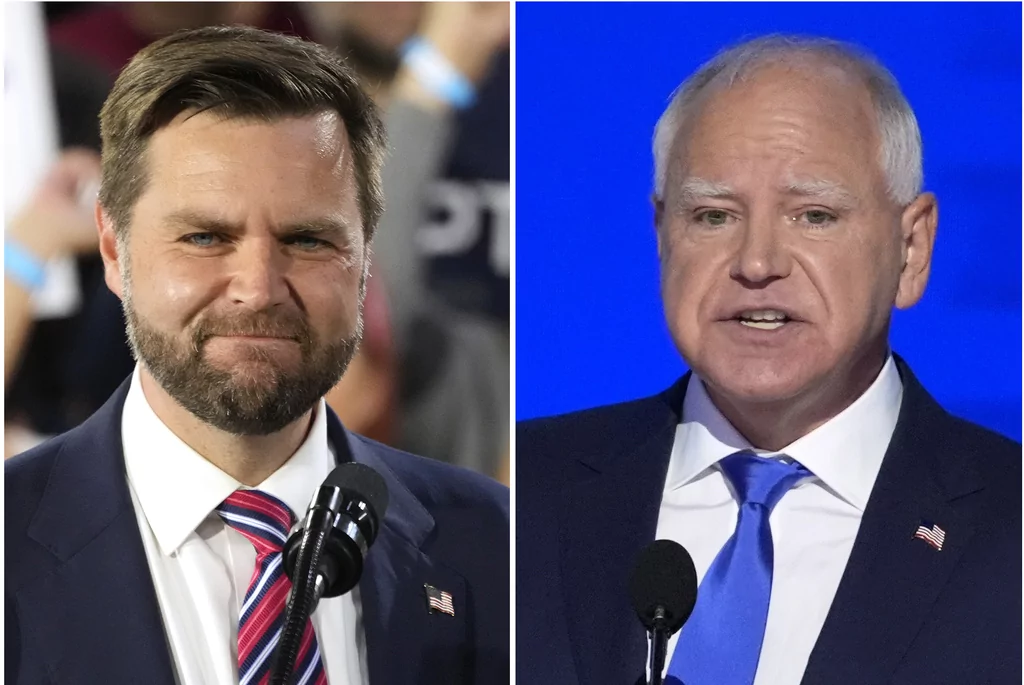

Sen. J.D. Vance (R-OH) and Tim Walz (D-MN) face off on Tuesday in New York, a matchup that may draw a few more eyeballs than unusual in a very closely contested race.
For one, GOP presidential nominee Donald Trump and Vice President Kamala Harris have only debated once rather than the typical three times, giving voters less opportunity to see the candidates meet face to face.
But Harris is also a relative unknown who became a candidate in July and has run a highly choreographed campaign since, thus raising curiosity for Walz’s appearance. Vance, 40, could represent the future of the MAGA movement since Trump, 78, would be term-limited even if he wins.
“Generally, vice president debates aren’t consequential. Usually you just hope they don’t say anything wrong,” David Schultz, a political professor at Hamline University in St. Paul, Minnesota, said. “But given the closeness of this race, the fact that a lot of voters don’t really know who Harris is, who Walz is, or who Vance is, I think that makes this one a little bit more consequential.”
A final factor is that this may be the last debate of any kind before Election Day. The vice president debate is usually sandwiched between three presidential showdowns, but that doesn’t appear to be the case this year as Trump has said he’s done, leaving fewer unscripted data points for voters to draw from.
“A few people may be saying, ‘Trump is getting kind of old, what if something happens to him? What’s Vance like?’ or ‘I don’t know much about Harris. Let me find out if Walz says something about who she is,” Schultz said. “In a race where it’s so close, a few thousand votes here or there could impact the outcome of the election.”
The 2020 vice presidential debate between Harris and then-Vice President Mike Pence drew an audience of more than 50 million people, according to Nielsen Media Research, a figure that may have been boosted by the pandemic lockdowns that kept people indoors.
The 2020 ratings easily surpassed those seen in 2016, when Pence faced Sen. Tim Kaine (D-VA) before an audience of 35 million.
Brad Bannon, a Democratic strategist, said Walz’s job will not be to attack Vance. Rather, it will be to attack Trump, the leader on the opposition party’s ticket. Similarly, he says Vance’s job will be to attack Harris rather than Walz.
“That’s what you do in the vice presidential debate,” he said. “You use it as an opportunity to go after the top-of-the-ticket candidates.”
Bannon expects Vance will aggressively attack Walz, but he thinks the key for Walz will not be to strike back but to “restrain himself enough so he doesn’t interfere with Vance saying incendiary and stupid things.”
Both Vance and Walz got into heated exchanges during their most recent debates. Vance tussled with his 2022 opponent, Rep. Tim Ryan (D-OH), over topics such as immigration and abortion, while Walz stared down his reelection challenger, Scott Jensen, over COVID-19 lockdowns and energy policy, among other things.
Things could turn ugly this time around too, even if neither candidate goes into the debate looking to strike a knockout blow.
John Feehery, a Republican strategist, says the key for Vance will be trying to paint Walz, and by extension Harris, as someone who can’t be trusted, while Walz will try to convince voters that Vance is “weird” and extreme.
“The big issue will be Walz lying about Vance and Trump’s record,” he said. “Walz, like Harris, is an exceptionally good liar, and I don’t know if Vance will be ready for it. And most likely, the moderators will be tipping the scales in the Walz direction.”
CLICK HERE TO READ MORE FROM THE WASHINGTON EXAMINER
Set for 9 p.m. Eastern time next Tuesday on CBS, the vice presidential debate could sway just enough voters in this deadlocked presidential contest to change the outcome. Or, per Republican strategist Doug Heye, it may not.
“The race is all about Trump vs. Harris. The undercard just isn’t registering for voters,” Heye said. “Though that won’t stop DCers from overanalyzing it.”





